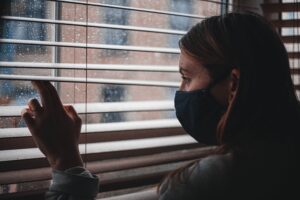STRESS AND THE IMMUNE SYSTEM
During the past year, due to the COVID-19 pandemic, we have all been put under stress for one reason or another.
We have seen rising problems like financial stress due to lack of work, loneliness due to limited social interactions, lack of adequate supplies due to supermarket shortages, and mental health issues like anxiety and depression due to fear of this pandemic.
Short term stress is beneficial because prepare us for a challenge and promote our innate fight or flight response, however long-term stress is detrimental. Why?

The immune system and the nervous system are interconnected by a feedback mechanism, to facilitate the involvement of the whole body in the immune response. Stress promotes the release of certain hormones: glucocorticoids and catecholamines, both produced by the adrenal glands. They help to prepare the body for a threat by shutting all non-essential body processes and give you the adrenalin rush. The heart beats faster, your lungs increase their capacity, your intestines slow down and there is an increase of glucose in the blood stream. All these processes are in place to help us fight or flight the threat more easily. But what happen when the situation is prolonged over days, weeks or even years? Our immune system starts to malfunction by dysregulating the balance between the innate and adaptive immune system (Th1 and Th2), promoting inflammation, and decreasing our immune cells. Our sympathetic nervous system seems to activate a set of genes called “conserved transcriptional response to adversity” that increase inflammation and protection to bacteria (to help us deal with acute threats). These genes unfortunately lower our protections against virus, and over time the chronic inflammation create damage in our cells.
We usually connect stress to work situations, but there are different types of stress. What we are experiencing during COVID-19 is a mixture of work-related stress (and/or low socioeconomic status), social stress (anxiety and discomfort related to stressful social situations) and loneliness. All these types of stress can result in mental health issues like anxiety. Is important to recognize these stressors and ask for help when we are struggling with it. Social support from family, friends and partners seems to alleviate the stress, particularly in lonely individuals. Also, by keeping your brain engaged, you can promote wellness. If you need some ideas on activities, you can check my article on free time here.
What we eat can also help us modulate our stress response: a small 2019 study (Hidese et al.) seems to show the efficacy of L-theanine on anxiety. L-theanine is found in green and black tea and seems to promote relaxation. Phosphatidylserine, contained in soy, egg yolks and white beans (amongst other) also seems to alleviate chronic stress levels at a dose of 400mg. Vitamin B6 is involved in the production of GABA, an amino acid that also acts as an inhibitory neurotransmitter, responsible for calming the brain, seems to anxiety and depression.
In terms of herbs, there are many that could potentially help to modulate the stress response: ashwagandha, rhodiola, ginseng, lemon balm, Brahmi are some options. Each herb has slightly different effects and can be more suitable for different individuals, hence the importance of consulting a qualified practitioner.
Disclaimer: consult your doctor or healthcare practitioner for any health issues and before starting a new health regimen.
REFERENCES:
Belsky, D. W., & Snyder-Mackler, N. (2017). Invited Commentary: Integrating Genomics and Social Epidemiology-Analysis of Late-Life Low Socioeconomic Status and the Conserved Transcriptional Response to Adversity. American journal of epidemiology, 186(5), 510–513. https://doi.org/10.1093/aje/kwx145.
Dhabhar FS. Effects of stress on immune function: the good, the bad, and the beautiful. Immunol Res. 2014 May;58(2-3):193-210. doi: 10.1007/s12026-014-8517-0
Fekete C, Siegrist J, Post MWM, Tough H, Brinkhof MWG; SwiSCI Study Group. Does engagement in productive activities affect mental health and well-being in older adults with a chronic physical disability? Observational evidence from a Swiss cohort study. Aging Ment Health. 2020 May;24(5):732-739. doi: 10.1080/13607863.2019.1576158. Epub 2019 Feb 21. PMID: 30789009.
Head KA, Kelly GS. Nutrients and botanicals for treatment of stress: adrenal fatigue, neurotransmitter imbalance, anxiety, and restless sleep. Altern Med Rev. 2009 Jun;14(2):114-40. PMID: 19594222.
Hellhammer J, Vogt D, Franz N, Freitas U, Rutenberg D. A soy-based phosphatidylserine/ phosphatidic acid complex (PAS) normalizes the stress reactivity of hypothalamus-pituitary-adrenal-axis in chronically stressed male subjects: a randomized, placebo-controlled study. Lipids Health Dis. 2014 Jul 31;13:121. doi: 10.1186/1476-511X-13-121. PMID: 25081826; PMCID: PMC4237891.
Hidese S, Ogawa S, Ota M, Ishida I, Yasukawa Z, Ozeki M, Kunugi H. Effects of L-Theanine Administration on Stress-Related Symptoms and Cognitive Functions in Healthy Adults: A Randomized Controlled Trial. Nutrients. 2019 Oct 3;11(10):2362. doi: 10.3390/nu11102362. PMID: 31623400; PMCID: PMC6836118.
Kafeshani M, Feizi A, Esmaillzadeh A, Keshteli AH, Afshar H, Roohafza H, Adibi P. Higher vitamin B6 intake is associated with lower depression and anxiety risk in women but not in men: A large cross-sectional study. Int J Vitam Nutr Res. 2020 Oct;90(5-6):484-492. doi: 10.1024/0300-9831/a000589. Epub 2019 Jun 11. PMID: 31188081.
Xu, J., Ou, J., Luo, S., Wang, Z., Chang, E., Novak, C., Shen, J., Zheng, S., & Wang, Y. (2020). Perceived Social Support Protects Lonely People Against COVID-19 Anxiety: A Three-Wave Longitudinal Study in China. Frontiers in psychology, 11, 566965. https://doi.org/10.3389/fpsyg.2020.566965








